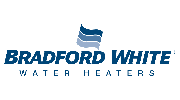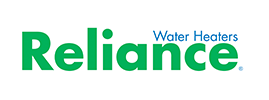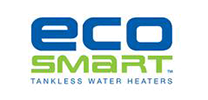At Hauck Bros Inc., we deal with 3 main types of residential water heaters. For commercial applications, we offer options that are custom quoted for your business.
- Electric Storage Water Heater
- Electric Water heaters have one or two electric elements that heat the water to a set point on an internal thermostat. Cold water goes into the unit where it is stored in an internal tank. The elements heat the water while insulation around the outside of the unit retains the heat. A temperature/pressure relief valve is on the outside as a safety precaution. That heated water is discharged through the hot water out.
- Gas Storage Water Heater
- Gas storage water heaters have a burner that heats the water. Because of the combustion process, gas water heaters need a discharge vent to the outdoors. Cold water comes into the storage tank, the burner heats the water, and hot water exits the water heater. Atmospheric sealed-combustion models have mechanisms in place to make sure that heat loss associated with venting outdoors is minimized making them more efficient to operate.
- Tankless Water Heaters
- Tankless water heaters provide hot water only as needed. They don’t have a storage tank so standby energy losses associated with storage tank water heaters are minimalized. Gas models use a burner and electric models use an element to heat water as it passes through a heat exchanger. Tankless models usually have an average lifespan of up to 20 years with preventive maintenance
To maximize energy and operating cost savings, look for an energy-efficient water heater. Energy Factor (EF) is based on the amount of hot water produced per unit of fuel consumed. The Energy Factor includes 3 parts. First, the recovery factor is how efficient the heat from the burner or element was transferred to the water. Second, standby losses account for the heat loss per hour from the stored water compared to the water’s heat. Finally, cycling losses are the loss of heat as the water circulates through the tank or pipes. Make sure to select as efficient a model as you can.
- If you have a storage water heater, make sure to flush a quart of water from the tank every three months and check the temperature and pressure every six months.
- Replace the Anode rods as needed to extend the life of the unit, a timeframe is tough here as it depends on the pipes, whether or not you have hard water, and the sediment that comes into the water heater from the water source.
- Check your drains every six months to ensure there are no clogs.
- Visually inspect the outside of your unit to make sure there are no rust spot or small leaks, if you see either, that could be a sign of immediate failure.
- Test the pressure relief valve on the unit off to ensure it is working correctly make sure to have a bucket.
- When going out of town, adjust the temperature on storage water heaters to “vacation” to maximize energy savings while you are away.
Water heaters should be serviced annually. Yearly servicing is included with some of our Home Comfort Protection plans.
Generally speaking, tanked water heaters have a lifespan of 10-15 years and their tankless counterparts will last roughly 15-20 years.
Benefits of Maintenance
- Prolongs equipment efficiency
- Promotes healthy clean air
- Supports lower utility costs
- Guards against unexpected failures
- Prolongs equipment life
- Keeps your equipment warranty valid
-
Drain Pan
- Helps prevent damaged from runoff and leaks, lining is corrosion resistant.
-
Stand
- Used to meet safety requirements by rising water heater to an acceptable height for code compliance,
-
Installation Kit Tankless
-
Wall Mount Kit
- Used to mount to wall.
-
Vent Kit
- Used to properly vent unit depending on installation requirements.












